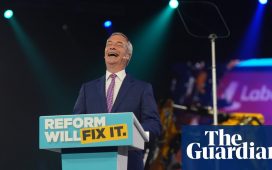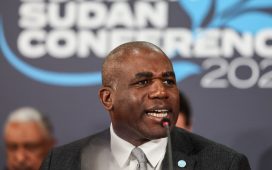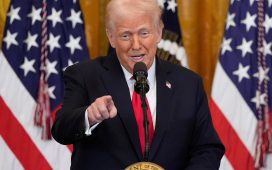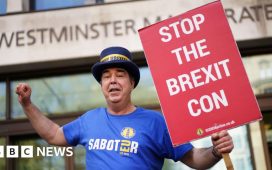No 10 hints Sunak open to reappointing Lee Anderson as Tory deputy chair despite rebellion over Rwanda bill
No 10 has hinted that Rishi Sunak is open to reappointing Lee Anderson as one of the Conservative party’s deputy chairs.
Anderson, a working-class rightwinger, resigned from his post two weeks ago because he wanted to defy the party whip and vote for “rebel” amendments to strengthen the Rwanda bill.
But he and Brendan Clarke-Smith, who also resigned as a Tory deputy chair for the same reasons, issued a remarkably conciliatory resignation letter, stating their “100% support” for Sunak.
Anderson has now told the Daily Telegraph that he should have voted for the Rwanda bill at third reading, instead of abstaining, and that he would like his Tory deputy chair job back.
At the post-PMQs lobby briefing, asked if Sunak would reappoint him, the PM’s press secretary said it was “the PM’s prerogative to choose and when” who gets which jobs. She went on:
I think we can say that we have a lot of time for Lee. He made it clear that he had concerns but actually he really supports getting this deterrent up and running so it’s good to see him talking about that today.

Key events
Afternoon summary
The prime minister spouts so much nonsense, no wonder they are giving up on him. Even now, as his government crumble around him and his own MPs point out that he is out of touch and has no plan for growth, crime or building houses, the prime minister is sticking to his one-man Pollyanna show—everything is fine; people should be grateful for him! The trouble is that no one is buying it. Does he actually understand why his own MPs say that he does not understand Britain, and that he is an “obstacle to recovery”.

Law Society criticises government for not scheduling Commons debate on UK-Rwanda treaty
Tom Pursglove, the minister for legal migration, has indicated in a Commons written answer that the government is not planning to let MPs have a debate and voter on the government’s treaty with Rwanda. He said the Rwanda policy had already been scrutinised by MPs in the debates on the Rwanda bill.
The Law Society of England and Wales has criticised this decision. Its vice president, Richard Atkinson, said:
It is extremely disappointing that the government won’t make time for the House of Commons to debate the Rwanda treaty, despite the House of Lords vote in favour of delaying ratification.
Given the supreme court found serious risks in the government’s Rwanda plan, this treaty ought to be scrutinised carefully to ensure the risks identified are fully addressed.
MPs’ calls for a proper debate on the treaty are being ignored. It’s crucial to debate the substance of the treaty because any shortcomings will fatally undermine the safety of Rwanda bill and the government’s wider asylum policy.
Earlier this month the home affairs committee said in a report there should be a Commons debate on the UK-Rwanda treaty.

Severin Carrell
The Scottish government has refused to respond directly to demands from Labour for confirmation that it has handed all Nicola Sturgeon’s private emails about the Covid crisis to the UK inquiry. (See 2.02pm.) In response, it said:
The Scottish government is committed to responding to both the UK and Scottish Covid-19 inquiries, as learning lessons from the pandemic is vital to prepare for the future.
It would be inappropriate to comment on any matters being considered by the UK Covid Inquiry while hearings are ongoing.
The permanent secretary will reply to the letter [from Labour] in due course.
Labour MP Tahir Ali apologises for using disrespectful language when critising Sunak’s pro-Israel stance

Ben Quinn
The Labour MP Tahir Ali has apologised for claiming that Rishi Sunak has “the blood of thousands of people on his hands” over his support for Israel. (See 12.38pm.)
Colleagues sitting behind Ali, the MP for Birmingham Hall Green, could be seen shaking their heads during prime minister’s questions as he levelled the accusation against Sunak, who promptly replied: “That is the face of the changed Labour party.”
Ali later issued two statements on X, formerly Twitter, saying:
(1/2) Earlier at PMQs I asked the Prime Minister about the actions of Israel in Gaza.
This is obviously a deeply emotive issue. While I do not resile from my strongly held views on the situation in the Middle East I would like to apologise for the way in which I described
— Tahir Ali MP (@TahirAliMP) January 24, 2024
Earlier at PMQs I asked the Prime Minister about the actions of Israel in Gaza. This is obviously a deeply emotive issue. While I do not resile from my strongly held views on the situation in the Middle East I would like to apologise for the way in which I described
2/2) the Prime Minister in my question. We all have a responsibility to be respectful in the language that we use, even when discussing difficult and, at times, sensitive issues.
Poorest nations suffering most from Houthi attacks on shipping in Red Sea, Grant Shapps tells MPs
The Houthi attacks on shipping in the Red Sea are affecting the poorest nations the most, Grant Shapps, the defence secretary, has claimed.
Opening a general Commons debate on the attacks, which have led to the UK twice participating in US-led airstrikes against the Houthis, Shapps said:
Some 12% of international trade passes through the Red Sea every single year … amounting to more than $1tn worth of goods. In addition 8% of global grain trade, 12% of seaborne-traded oil, and 8% of the world’s liquefied natural gas all passes through this ancient seaway.
Perhaps even more astonishing is that 40% of the goods that are traded between Europe and Asia go through the Red Sea as well. Sadly, the Houthis’ unlawful and callous attacks are putting all of that trade at risk …
What these Iran-backed Houthi pirate thugs forget is that it is the least well-off nations and people who suffer the most from their illegal actions, starting with Yemen itself, where almost all of their food comes to it by sea.
So at times like this, these nations need to be stood up to, and nations must stand up to them. Attacks on Red Sea shipping automatically make this a global problem.
UK government says it is considering limiting what civil servants in Scotland can do on Westminster reserved matters

Severin Carrell
The Scottish and UK governments are heading for a fresh battle over contentious Scottish policies such as independence after ministers in London confirmed they plan to release new rules to civil servants on reserved powers.
The Labour peer George Foulkes has waged a long-running campaign to bar ministers in Edinburgh from spending public money on a second independence referendum, and on Scotland’s network of “pretend embassies” overseas, claiming those are reserved matters.
The UK government today told a Lords constitution committee, in a response to a report on civil service appointments:
The government recognises the strength of the argument that further guidance to tighten up best practice is required and is in the process of considering how such guidance would support civil servants working in the devolved administrations on areas that may relate to reserved matters, and help ensure the civil service code is always maintained.
This confirms earlier pledges to do so, but Foulkes said:
The SNP project has deliberately gnawed away at the boundary between devolved and reserved matters, and this report serves as a very timely reminder that utilising civil servants to support efforts to break up the UK does not fall under devolved competencies.
However, words must now be turned into actions. One rogue administration cannot be allowed to stain the integrity of our civil service, with their petty identity politics.
This raises tricky issues around constitutional proprieties. The SNP has won four successive Holyrood elections on a manifesto proposing independence. Previous Labour and Lib Dem administrations in Edinburgh funded overseas missions to promote inward investment. Would restrictions here be a precedent barring spending on other election pledges?
Foulkes and other critics argue the UK supreme court ruling in 2022 that Nicola Sturgeon could not hold a second referendum without Westminster’s approval makes it ultra vires to spend public money on issues reserved to Westminster. But so far, no Scottish spending has gone on setting up an unlawful referendum.
The Scottish government said it had “a clear mandate to provide the people of Scotland with the information they need to make an informed choice about their future”. It added: “It is the role of the civil service to support the elected government of the day in developing and implementing its policies.”
Referring to the extract from the Commons order paper published earlier (see 11.56am), a reader asks:
On the list of people due to ask questions why do some get a ‘Mr’ or ‘Mrs’ and others do not?
And here is the answer from a Commons official.
Members are able to choose the title applied to their preferred form of name, which is displayed on the members’ biography pages of the website and in other procedural systems in parliament. Shortly after a member joins the house, a member will be contacted by the house administration where they can request their preferred form of name, which is then added to their biographical record. Preferred forms of name can be changed over time based on the members’ preference.
No 10 says conscription not being considered after army chief says war against Russia would be ‘whole-of-nation undertaking’
The people of the UK are part of a “prewar generation” who must be prepared to fight a major war against Vladimir Putin’s increasingly aggressive Russia if necessary, Gen Sir Patrick Sanders, the head of the army, argued in a speech.
But, as Dan Sabbagh reports in his story, the Ministry of Defence insisted that Sanders was not proposing peacetime conscription.
Downing Street and the Labour party both insisted they would not back conscription. At the post-PMQs lobby briefing the PM’s spokesperson, when asked if Sunak would rule out conscription, replied:
There is no suggestion of that. The government has no intention to follow through with that.
The British military has a proud tradition of being a voluntary force. There are no plans to change that.
And Keir Starmer’s spokesperson told journalists that conscription was not Labour policy.
DUP have negotiated ‘very good deal’ over changes to Windsor framework, Tory MP tells Commons
MPs are currently debating the Northern Ireland (executive formation) bill, which gives more time for a power-sharing executive to be formed before elections legally have to be held because no executive is in place. It sets 8 February as the new deadline and yesterday Chris Heaton-Harris, the Northern Ireland secretary, suggested that he hoped that by then the government would have successfully persuaded the DUP to lift its boycott of power sharing.
The DUP has been refusing to sit in the executive as a protest against the post-Brexit trading rules set out in the Northern Ireland protocol, and its revised version, the Windsor framework. In the debate Julian Smith, a former Tory Northern Ireland secretary, said he thought the DUP had negotiated a good deal. He said:
[Sir Jeffrey Donaldson, the DUP leader] and his team, I understand, seem to have negotiated also a very good deal with the government on issues around the Windsor framework and I hope in the coming days and weeks we will be able to see the results of that work.
I am sure some within his party will still have concerns this will not be perfect, but much better now, having moved forward and done so much work over the last few months, to go back into the executive and to make the further arguments from there.
Sky’s Sam Coates says the DUP may have secured the removal of checks on goods going from Great Britain to Northern Ireland.
Lots of speculation about what the DUP might have been offered to them to get them back to Stormont.
I’m told there it included a change to the law to “direct” the end of any checks on goods moving lawfully GB to NI and an Independent Monitoring Panel
Since’s it’s a “domestic” matter, the UK were going to +inform+ not negotiate with the EU.
Lots of speculation about what the DUP might have been offered to them to get them back to Stormont.
I’m told there it included a change to the law to “direct” the end of any checks on goods moving lawfully GB to NI and an Independent Monitoring Panel
Since’s it’s a “domestic”…
— Sam Coates Sky (@SamCoatesSky) January 24, 2024
Labour says it was ‘clearly inappropriate’ for Tahir Ali to say Sunak has blood on his hands due to support for Israel

Ben Quinn
Keir Starmer’s spokesperson has described a claim by a Labour MP that Rishi Sunak has “the blood of thousands of people on his hands” over support for Israel (see 12.38pm) as “clearly inappropriate”.
Colleagues sitting behind Tahir Ali, a Birmingham Labour MP, could be seen shaking their heads during prime minister’s questions as he levelled the accusation against Sunak, who promptly replied: “That is the face of the changed Labour party.”
Asked about the comments, Starmer’s spokesperson said:
That language is clearly inappropriate and not language we would support or endorse …
This absolutely is a changed Labour party and you’ve seen that in the commitments that Keir Starmer has made in his leadership campaign and has followed through on during the course of his leadership.
However, the Conservative party quickly moved to weaponise the exchange, launching a clip on its official X account saying:
Same old Labour.
The only thing Keir Starmer has changed is his own position on everything he says.
Labour criticises government over figures showing cuts in police numbers

Rajeev Syal
The government has cut the number of police officers serving in the unit responsible for smashing Channel smuggling gangs, according to figures released today.
Police workforce statistics published by the Home Office show that there has been a cut of 343 National Crime Agency officers, as well as cuts of 311 police officers, 611 PCSOs [police community support officers] and 511 special constables between March and September 2023.
Yvette Cooper, the shadow home secretary, said:
On a day of more Tory infighting, these are bombshell statistics that show the Conservatives cannot be trusted to keep our streets or our borders safe.
Not content with cutting bobbies on the beat from our local communities, they are now cutting NCA officers too – the law enforcement body responsible for smashing the smuggling gangs operating in the Channel.
Rachel Harrison, national secretary of the GMB which represents PCSOs, said:
PCSO numbers are being cut to the bone and the number of police staff remains well below 2010 levels. There are shortfalls across staff groups – from 999 call handlers to scene of crime investigators.
These cuts are making our communities unsafe – it’s time for the government to invest in police staff.










